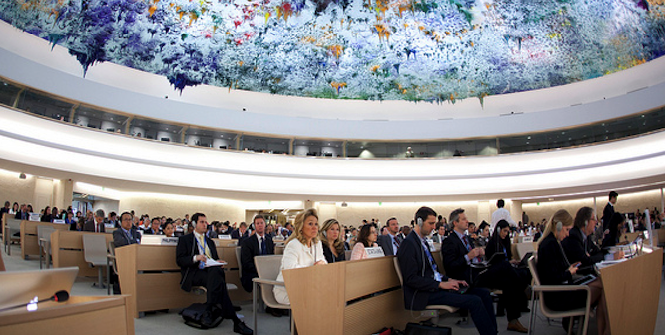A More Humane Australian Foreign Policy

Australia is in a contest with France and Spain for a place on the United Nations Human Rights Council for a two-year term commencing in 2018. If successful, it offers an opportunity for Australia to place human rights and human security at the centre of its policy debates, both at home and abroad.
“Australia is committed to a better world,” said Minister for Foreign Affairs Julie Bishop in announcing Australia’s bid for a seat on the United Nations Human Rights Council last year. The bid was originally launched by the Labor government and is for a two-year term commencing in 2018.
In announcing support for the bid, Julie Bishop stressed Australia’s record of support for human rights and spoke of five pillars underlying the bid: “freedoms of expression and of religion; good governance; gender equality and the empowerment of women; the rights of Indigenous peoples; and strong national human rights institutions and capacity building.” Philip Ruddock’s appointment as special envoy for human rights was largely intended to promote the Australian bid, echoing the globetrotting of the Rudd government in its effort to win a seat on the Security Council.
The UN Human Rights Council (UNHRC) was established in 2007 to replace the Commission on Human Rights, which had existed for almost 60 years. It was hoped that the new council would be less politicised and more willing to criticise states with appalling human rights records, but as the UNHRC is currently chaired by Saudi Arabia the changes are not major. The council has, however, added one significant feature, namely universal periodic reviews of all UN member countries, which allows for a public review of each state every four years. Some states have taken note of at least some of the recommendations of these reviews, though more often they are ignored or at best reinterpreted. Sri Lanka responded to calls to decriminalise homosexuality by claiming there was no contradiction between retaining the criminal laws and the protection of people from discrimination based on sexual orientation.
NGO and academic observers view the UNHRC as somewhat more effective than the old commission, although still subject to political pressures and double standards. The basic dilemma of the council is that its membership is based on that of the UN, so that a majority of member states come from countries without any genuine commitment to what human rights advocates would regard as fundamental freedoms. Australia is part of the “western Europe and other” grouping, which links us to countries that we share a common political culture with but no regional ties, except with New Zealand. Just as Australia had to compete for votes with two European states to win election to the UN Security Council in 2012, it is now in a contest with France and Spain for a place on the UNHRC.
Australia’s chances were harmed earlier this year when former President of East Timor, Xanana Gusmao, said his country would not support the bid because of long-running disputes over the maritime border between the two countries. Other issues, above all Australia’s treatment of asylum seekers, are proving an obstacle for the government.
Human rights are not central to our concept of politics. Unlike most other liberal democracies Australia has no bill of rights, although there are legislated charters of rights in both Victoria and the ACT. While the concept of rights often appears in political debate in Australia, there are no foundational documents, such as the American Declaration of Independence, to which citizens can appeal. Rights are protected through common law and a series of statutes such as anti-discrimination legislation at both the federal and state level.
The Australian Human Rights Commission, established by the Hawke government in 1986, seeks to monitor Australia’s adherence to a number of international human rights agreements but it has no oversight of foreign policy. Like almost every other state, Australia’s approach to human rights in the international arena is patchy, inconsistent and subject to convenient amnesia when principles clash with perceived national interest.
Towards a more coherent human rights perspective
The most coherent attempt to spell out how human rights might infuse Australian foreign policy came from Foreign Minister Gareth Evans, who wrote a significant statement of foreign policy in his early years in the portfolio. Importantly Evans and Bruce Grant sought to demonstrate self-interest in promoting human rights:
There is a real sense in which by embracing the cause of those who have been denied their rights, we also guard and reinforce the nature of those rights themselves. The historical record shows clearly enough that rights not defended are rights easily lost. More generally, in the longer term the evolution of just and tolerant societies brings its own international returns; in higher standards of international behaviour, and in the contribution that internal stability makes to international stability and peace.
In subsequent conversations with me, Evans has stressed the need to be consistent in promoting rights and to recognise this has to be done with care: arguing for rights can be productive, unproductive or counter-productive, and we need to avoid the latter.
Unlike the countries of the Atlantic world, Australia sits in a region where Western understandings of human rights are not necessarily widely shared and where too enthusiastic promotion of rights can easily be dismissed as neocolonial interference. If we are serious about making a concern for human rights central to foreign policy we need to be very clear about what we regard as fundamental rights, and be consistent in how we apply them. At the same time we need to recognise that human rights are deeply contested and there can be genuine disagreement as to what they encompass.
The very concept of human rights may now be too associated with Western hubris; it might be more useful to speak of basic rights and seek a common language that does not assume Western-style democracies as the only possible way of guaranteeing rights. Basic rights fall into two broad categories: protection from physical harm by both state and non-state forces; and access to the necessities of life such as clean water, adequate food, sanitation, shelter and health care. Imagine perhaps the core agendas of Amnesty and Oxfam combined to develop a new paradigm.
A decade ago, Australian academic Robyn Eckersley argued for a more democratic foreign policy built on “a national imaginary that is hospitable, tolerant, generous to others and compassionate towards less fortunate strangers.” She wrote this shortly before the election of the Rudd government in 2007, and it would be hard to argue that Australia has progressed in this direction over the past decade.
As is clear from the bipartisan stigmatisation of asylum seekers and the current fears of terrorism, Australia is noticeably less generous and hospitable than Rudd promised at his election. In the atmosphere of heightened security fears and hostility to Muslims debate on foreign policy has seemingly been muzzled. The Labor Party is careful to not allow any difference to appear between it and the government on questions related to national security, although it has been critical of the size of cuts to development assistance, and even the Greens rarely speak of foreign policy issues.
The greatest advantage in Australia’s bid for membership of the UN Human Rights Council is the potential it offers for a more nuanced discussion of foreign policy and human rights back home. The government will have to answer hard questions about its domestic record, even in those areas highlighted by Bishop, such as indigenous rights. Placing human rights and human security at the centre of debate moves us away from the current obsessions around trade, terrorism and submarines, and recognises that threats to security are rapidly changing.
Dennis Altman is a professorial fellow in human security at La Trobe University and the director of the Institute for Human Security at La Trobe. This article is an extract of a piece originally published by Rights Now on 25 June and is republished with permission.




